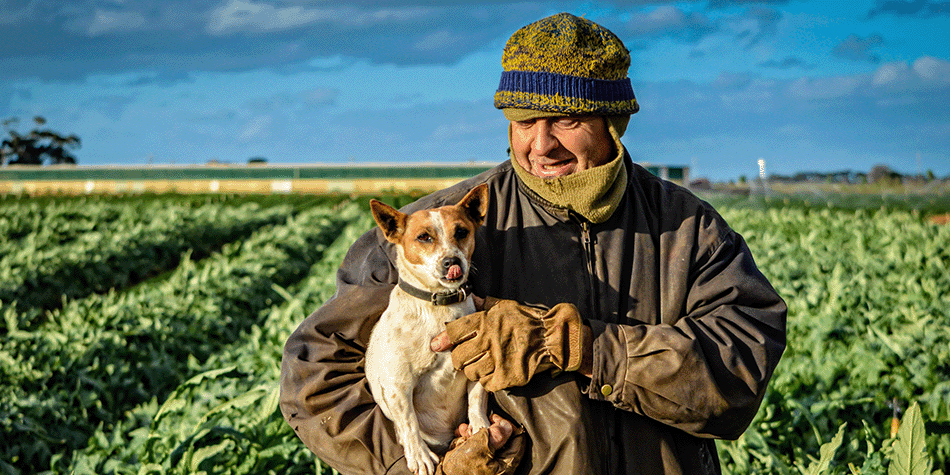It’s an incredibly sobering statistic – every 10 days, an Australian farmer dies by suicide. Compounding this, access to mental health professionals for farmers reduces with increasing remoteness.
Australia relies on farmers to stock the nation’s supermarket shelves and power our exports, but much more needs to be done to support their mental health. That’s where a unique research centre at Deakin University is making a real difference.
Founded thanks to the visionary support of the Geoff & Helen Handbury Foundation, the National Centre for Farmer Health (NCFH) is operated in close partnership with Western District Health Service, and is based in the agricultural hub of Hamilton, 300km west of Melbourne.
A new, targeted mental health program, Back on Track, is currently in the community consultation phase after two years of deep engagement with Victorian farmers who co-designed it. Back on Track utilises behavioural activation therapy and is a peer-to-peer program administered by members of the farming community. It is the first such intervention to be trialled in Australia.
Dr Alison Kennedy (GCertHELT ‘20 Deakin) is Director of the NCFH, and leads Back on Track. Research results she co-published in 2014 confronted the shocking silence that surrounded farmer suicide in Australia at the time.
'I have tried to have conversations and to drive an agenda towards really understanding and addressing the situational factors that contribute to that risk of suicide,' Dr Kennedy says.
'My work since publishing has been driven by addressing a lot of the underpinning factors, and looking at ways that we can prevent those risks.'
Dr Kennedy’s research mission has a deeply personal dimension – she lost her niece to suicide, which inspired her to complete her PhD on this topic and has continued to shape her work since then.
Back on Track is anchored in the mutual trust and respect of its participants, with behavioural activation chosen as the therapeutic modality because its principles can be quickly learned and applied in a practical way.
'There's good evidence that behavioural activation works to reduce the symptoms of depression, just as effectively as medication,' Dr Alison Kennedy explains.
It's about people being able to monitor and understand their mood, and relating it to the activities that they're doing at the time. Once they have an understanding of this connection, then they work to actively schedule activities into their day that bring them a sense of achievement or pleasure.
Dr Alison Kennedy
Director, National Centre for Farmer Health
Funding received from the Gardiner Foundation has allowed Back on Track to focus on three different communities located in Corangamite, Towong and Wellington Shire. The feasibility trial cohort is small – nine peer workers, and 40 community members experiencing low mood or depression. Dr Kennedy hopes that new funding can be sourced to allow a national implementation trial to follow.
The health profile of Australians living in rural areas is systematically worse compared to those living in major cities. Life expectancy is lower in outer regional and remote Victoria than in metropolitan Melbourne. In Greater Melbourne life expectancy is 84.4 years, while in outer regional and remote areas of Victoria it's 81.8. This difference also manifests in a greater disease burden for residents in rural areas.
Another NCFH project driven by community need is AgriSafe which has enabled free one-on-one preventative health assessments tailored to the needs of farmers since 2010. Specially trained AgriSafe nurses engage with farmers in their own local community.
'It would be fantastic to have some support to be able to do a full-scale AgriSafe rollout across Victoria,' Dr Kennedy says.
'We've already been able to demonstrate that the service saves the health system money. We’ve got a growing number of partnerships to support this project, including the Victorian Alliance of Rural and Regional Community Health, comprising 11 distinct services across the state. We do need additional funds to be able to do the background work to scale AgriSafe to the level we’d like. It's a shovel-ready, fantastic program but we just need a bit of a kickstart.'
Early intervention is the key
With more than three quarters of those surveyed starting work on farms before they turn 15, secondary school students are the focus of the Gear Up for Ag program.
NCFH teams deliver these four-hour workshops within schools, focusing on the connection between farm hazards and the impact on health outcomes. Students are engaged through demonstrations and interactive activities to build their understanding of common hazards, promote health and wellbeing, and empower them to improve their farm safety practices.
The team at the NCFH have now extended the reach of their secondary student farm safety program by developing Shifting Gears — a series of engaging videos and teacher resources, to encourage classroom conversations and empower the next generation of farmers to change the way farming is done. NCFH’s most popular resource is its Managing Stress on the Farm booklet, with more than 60,000 copies printed.
Interested in finding out more?
The National Centre for Farmer Health is a partnership between Western District Health Service and Deakin University. NCFH develops timely, appropriate, effective and popular interventions that focus on prevention and early identification of risk factors associated with farming populations.

